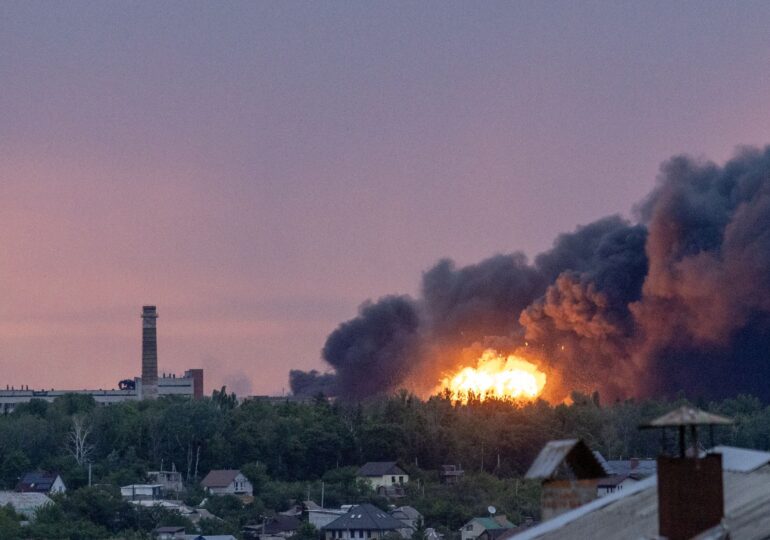The drone attack on the Russian airbase, which destroyed strategic bombers Tu-95, Tu-22, and A-50 aircraft, represents a major blow to the Kremlin, says retired commander Sandu Valentin Mateiu.
This episode, he argues, hit Russia’s nuclear „triad,” sending a clear signal: Ukraine is capable of hitting critical points of the Russian military apparatus.
The impact is both military and, especially, political - "the nuclear superpower has been hit and cannot hide this," says Mateiu, a former intelligence officer in the Romanian Army. As a result, Vladimir Putin is pushed to escalate the conflict.
Nuclear response - unlikely, but the threat persists
Although Putin doctrinally has the cover for a nuclear response, Commander Mateiu considers it unlikely for the Russian leader to resort to such a measure. The reason: the political and diplomatic costs would be enormous, and the military gain, relative.
However, the discourse in which Putin labeled Ukraine as a "terrorist state" is dangerous. Terms like "critical infrastructure" and "terror" could be the prelude to massive and symbolic strikes.
The commander warns of the risk of a "decapitation" attack on the Ukrainian leadership - a precise strike on Kiev, possibly even with Iskander-M missiles.
Moscow's targets for 2025–2026: a long-term war
According to Mateiu, Russia already has operations planned for 2025 and 2026, with clear objectives: complete occupation of Donbas, the Sumy-Kharkiv strategic corridor, and, in the south, control over Zaporizhzhia and Odesa.
The ultimate goal is clear - the elimination of Ukraine as a state with access to the sea, turning it into a weak and isolated entity, geopolitically irrelevant.
"The entire Novorossia project aims for this: to push Ukraine towards Galicia and Poland, devoid of access to the sea," says the commander.
Both sides face huge losses. Estimates cited by Mateiu indicate one million Russian casualties and 400,000 lost Ukrainians. The war, he says, has become existential for both parties - Ukraine fights for survival, Russia for maintaining an image of power.
"The tragedy has not broken the spirit of the Ukrainians," says Mateiu. Instead, in Russia, contempt for soldiers' lives is offset by the recruitment payment system - a "state mercenary" system designed to maintain a flow of fighters.
Putin, a dictator with a system that still works
The political system in Russia, although corrupt and authoritarian, operates efficiently, notes Mateiu. "There is no signal that the system is wavering."
In contrast, in Ukraine, being a democracy, there is constant feedback: commanders protest, grievances come to the surface.
In Russia, "silence, terror, and corruption" prevail. However, history shows that similar systems have collapsed abruptly - as happened in World War I.
Economy - Achilles' heel for both sides
Economically, Ukraine critically depends on Western aid. Without military and financial support, Kiev will not be able to sustain the war effort.
Russia, although has coped with sanctions so far, is starting to feel the strain. The war economy is "humming," but the rest of the sectors suffer.
According to Mateiu, the relationship with China is unequal - "Russia has become a trailer of the Chinese economy," and politically is the weaker partner in the bilateral relationship.
Militarily, Russia has always had a numerical advantage: manpower, artillery, drones. But Ukraine has compensated through quality - innovation, decentralization, tactical initiative.
Access to Western technology and the ability to adapt quickly are Kiev's main assets. It is a constant competition between masses and precision, between past and future, between oppression and creativity.
Current situation on the front: Russians advance slowly but steadily
On the ground, the Russian offensive is in full swing. If in 2023 the only major success was the capture of Avdiivka, in 2024 the pace has increased.
The situation is serious in Sumy, where a crisis is imminent if the Russians are not stopped. In Donbas, Pokrovsk and Konstantinovka are directly targeted, and communication lines have already been disrupted.
In Zaporizhzhia, the offensive seems to have started, although without clear results yet. Moscow's strategy is to force the front's expansion to exhaust Ukrainian resources and facilitate a possible decisive breakthrough.

